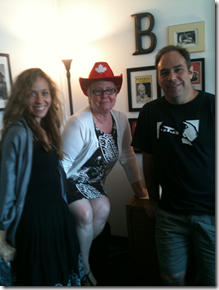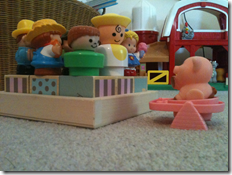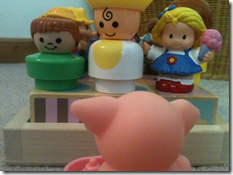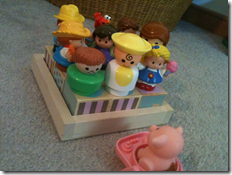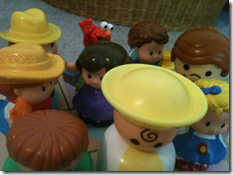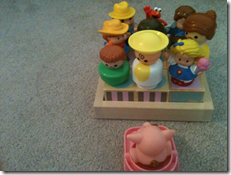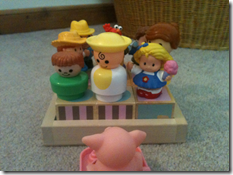Matthew Dicks's Blog, page 599
July 18, 2011
Harry Potter wants my wife
I don't like the advertising slogan for the new Harry Potter film one bit.
IT ALL ENDS.
7.15
My wedding anniversary is July 15.
I keep expecting Daniel Radcliff to knock down my front door, flourishing a magical wand and a flying broom, and steal my somewhat willing wife away.
Unequal footing and a first peek into St. Martins Press
Prior to performing at The Moth last Tuesday, I stopped by at the beautiful Flatiron Building for a meeting with my editor, her assistant and the social media director for St. Martin's.
It's always slightly surreal to meet someone who knows me through Twitter and my blog but who I do not know at all. Paul, the social media director, had clearly spent a good amount of time reading my blog, my Twitter stream and my Facebook fan page in preparation for our meeting, and so there was an immediate imbalance in our relationship as I sat down at the table.
I was meeting him for the first time, for example, yet he already knew how I might feel about his watch.
"Hi, I'm Paul," he said. "And my watch cost 80 bucks."
Last week I met with a DJ client in my home, and the bride-to-be told me that she already felt familiar with the layout of my house based upon her faithful reading of my blog.
Again, a slightly surreal imbalance of the relationship.
Last week, my wife had lunch with a friend who reads my blog, and she told Elysha that because she reads it so regularly, she feels that she knows me intimately.
Again, an imbalance.
This is probably a good thing. I write my blog simply because I desire a venue to express my thoughts and ideas, and I use Twitter and Facebook for many reasons, but one is to connect to people.
Apparently all this is working.
One of my friends likes to say that I "live loud."
Paul was exceedingly helpful in terms of social media. He had a list of ideas to fine-tune my use of Twitter and Facebook, including the importance of remembering that my Twitter followers and Facebook fans are probably two distinct audiences with differing interests and needs, so I should be catering my posts more specifically to each one.
Very true.
He also reassured me about my scattershot approach to my blog. There are competing theories when it comes to blogging. Some people believe that it's important to find a niche and become an expert on a specific topic, and that this is the way to draw an audience.
Others (like me) use blogging to express thoughts and ideas and share aspects of my life with others, and I believe that as an author, this is the best use of blogging. Rather than focusing my blog on subjects like writing or teaching only, I attempt to achieve broad appeal while giving readers and fans a peek into my life.
It is what I wish some of my favorite authors would do more often.
And Paul approves.
Paul and my editor also suggested that I share more of the inner workings of the publishing process with my readers, since this is an area that many people are curious about and have no access.
And since I have a new book coming out next year and am in the process of writing the next, and I am now with a new publisher, this is a good time to share the process with readers.
Thus this post.
As my next book, MEMOIRS OF AN IMAGINARY FRIEND, begins its way through the publishing process, I'll be sure to share as much of the process with you as possible, and if there are any questions that you might have about the publishing industry in general, please let me know!
A couple other random thoughts from my afternoon at St. Martin's included:
I discovered that it is exceedingly easy to read the body language of my editor, Brenda Copeland. Also, if slightly pressured, she is willing to be photographed wearing a red cowboy hat. I sometimes worry about the structural integrity of the Flatiron building based upon the sheer number of books contained therein. Our meeting with Paul took place in a room that was wall-to-wall books, and I have yet to leave the building without new books under my arms. I want an assistant. Brenda has an assistant named Laura, and I am jealous. I forget that an assistant isn't just someone to help you get things done. It's like having a second brain working for you. I like the look of my printed manuscript. I never get to see it in actual page form unless is has a bunch of red marks all over it. It looks so nice, sitting on its shelf, so clean and presumably perfect.Elmo says, Pick me! Pick me!
When I saw this scene at first, I didn't think much of it. A bunch of little people standing on a wooden puzzle with a pig positioned just below them in a chair.
Big deal. Not the most interesting scene my daughter has ever created, and probably not worth photographing.
No discernable storyline.
But then I noticed Clara's placement of Elmo in the back, hand raised, looking like he's trying to get the pig's attention.
Perhaps trying to get the teacher's attention.
Yes, it's possible that Clara randomly placed the people (including Elmo) on the puzzle, but I like to think this was purposeful.
Too good to be a coincidence. Don't you think?
July 17, 2011
I hate mulligans
I played golf last week with a guy who has a 3 handicap.
For you non-golfers, this means that he is an extremely good player. And by all accounts, he was, scoring well under par for the first six holes.
Which is why it annoyed me so much when on the seventh hole, he hit a tee shot that flew wide right, and he opted to take a mulligan and hit again.
A mulligan, for you non-golfers, is a do-over. It's a chance to hit another ball after an errant shot. Golfers who play with mulligans generally permit themselves one per round, thought I've played with knuckleheads who take as many as they please.
My friends and I do not play with mulligans, and rightly so. We treat every game as if we were playing in the US Open. We play by the rules. We require each other to make six inch putts when most golfers would be permitted to pick up the ball on the assumption that their putt would be good.
We are bastards on the golf course, but we play the game correctly.
And none of us is even close to a 3 handicap.
I am of the opinion that a guy with a 3 handicap should never be taking a mulligan, but I am also of the opinion that no one should be taking mulligans, regardless of their skill level.
I despise mulligans, for three reasons:
1. Golf is the only sport that allows this kind of ridiculous do-over. It is akin to getting a fourth strike in baseball, a third free throw in basketball, or a fifth down in football. For a sport that is supposedly predicated on integrity and is famous for its players assigning themselves obscure penalties, there is no room for a mulligan at any level.
2. Golf is a game of personal bests and moments of potential greatness. Stick a mulligan into a round and you ruin your chances for both. What if, for example, that 3 handicapper went on to shoot his lowest round ever, including a hole-in-one on the last par 3?
Unlikely? Yes. But not impossible.
So now what? He's got the scorecard of his life in his hand, but on the seventh hole, he took a mulligan, thus tainting his round.
Does he frame this illegitimate scorecard?
Does he tell his friends about the mulligan when describing the round?
Does he conveniently forget about it?
One never knows what could happen on a golf course. Unlike most sports, you can play golf exceptionally well or exceptionally poorly on any given day, and it is completely unpredictable. Playing with a mulligan taints a player's opportunity for genuine greatness.
3. But here is the biggest reason why I despise the mulligan:
A mulligan is almost always taken after an errant tee shot and never anywhere near or on the green.
In other words, it's perfectly acceptable in the minds of many golfers to take a second tee shot if the first has sliced into the trees or rolled twenty yards from the box. But it would never be considered appropriate to take a mulligan after missing a 6-foot putt or failing to get a ball out of a sand trap.
For some reason, a premium is placed on the tee shot, and doing so favors the long ball hitters by giving them a second chance to take advantage of the part of the game that they excel at most.
I am a good putter. It is probably the best part of my gamer. But if I was playing with a mulligan, I would never be permitted to take a second shot at the 30-foot putt I just missed. Taking a mulligan on a putt is unheard of.
I would have to live with my miss, as I should. As should we all.
The mulligan also negates the dangers inherent in being a long ball hitter. Because these guys can hit the ball great distances, an errant shot can often be costly. There is no telling where the ball may land, or even if it will be found. For a player like me, who does not hit a long tee shot, the one advantage I have is that my tee shot rarely gets me into trouble. I don't hit the ball far enough to lose a ball or end up buried in the woods.
Give a long ball hitter a mulligan and you've given him every reason in the world to swing out of his shoes, because he has a do-over in his pocket.
And yet, despite the integrity and tradition attached to this game, I continue to play with guys who take at least one mulligan every round. And even worse, it seems like the better the golfer, the greater the chances that he will take a mulligan.
So here is my plan:
The next time I play golf with a guy who takes a mulligan, I am going to purposely miss a putt on the subsequent green.
Hopefully an easy one. A three footer.
Then I'm going to walk over to my ball, pick it up, return it to its previous spot on the green and say, "Yeah. I thought I'd take a mulligan, too."
I can't wait to see what happens.
Women stick together at every age
My wife recently got a haircut. When she came home, she asked our two-year old daughter what she thought it.
She said, "Daddy has to love it."
Wisdom beyond her years, my friends.
July 16, 2011
Are writers colonies good for writing or simply indulgent escape mechanisms for the undisciplined?
The first two paragraphs from a recent New York Observer column reads thusly:
They summer in the colonies, the writers of New York, scattering forth to the hills as the days grow more sultry: to Yaddo, to MacDowell, to Millay and Ledig House! They go to work, of course, to work uninterruptedly and produce literary classics, and then, after all that exhaustive working, to play Ping-Pong and drink. But what of those left behind? The husbands and wives who change diapers and listlessly push swings on garbage-strewn urban playgrounds while their spouses stroll the green glades?
These spouses have to speak in baby talk to screaming children while their lovers giggle at the witty asides of sculptors and poets. While the colonists collapse in Adirondack chairs with cheeks flushed from a riotous game of table tennis, the city-bound are taking out the trash and eating bad takeout.
My first thought:
How am I going to get my wife to agree to send me to one of these colonies, and soon?
My second thought:
Two weeks? Honestly, after a couple days I think I'd really start to miss Elysha and Clara. Who do so many people seem to want to have kids and then get the hell away from them as quickly as possible?
If I could just find about four hours of undisturbed quiet a day in a library, a bookstore, or my kitchen table, that would be golden.
Hell, I'd take two.
My third thought:
Why does anyone even need to go to a colony to write? Picnic baskets on your doorsteps at lunchtime? Jacuzzis and ping-pong? Drunken stupors and evenings filled with Adirondack chairs and extramarital affairs? It all sounds a little self-important, self-indulgent and overly precious to me.
And none of it sounds very much like writing.
It's so odd how so many writers seem to want to disconnect the process of writing from diapers and dishwashers and family and fast food, as if the two cannot coincide.
It's a nice thought, but I hardly think it is reality.
And I suspect that it makes for bad writing.
My final thought:
Sure, it might be nice to get away for a couple weeks to get some writing done, but honestly, what is wrong with the kitchen table? Or the local library? Or a bench at a local college? Or an office in the attic? I run into so many people who talk about the tools of writing and the location of the writing and the beverage of choice whilst writing but not the actual writing.
These colonies sound perfect for the undisciplined person who likes to think about writing and talk about writing more than he or she likes to actually write.
As a writer, I find myself needing to write on an everyday basis, regardless of the stark and tragic absence of picnic baskets and table tennis tournaments and extramarital affairs.
For me, I write in between life. In the spaces between the diapers and dishwashers and family and fast food.
And regardless of what you may think, there are lots and lots of in-betweens if you are serious about assembling words and sentences on a page.
If you want to write and you want to publish, you make the time.
July 15, 2011
Public marriage proposal: FAIL
I recently wrote about my 5 rules to the successful marriage proposal.
Having executed my own successful public proposal, I felt qualified.
This proposal is ill advised on so many levels.
Black and invisible
Quick. Name me the last three missing or murdered children who you can think of excluding Caylee Anthony.
Done?
Okay. Now tell me how many of those children are not white.
And while we're at it, how many are not female and not blond?
In fact, name just one missing or murdered child who was not white.
Or one missing or murdered person who was not white.
Just one.
Can you?
If you're like most people, you probably named Elizabeth Smart, Madeline McCann, Jon Benet Ramsey, and perhaps Susan Smith's nameless murdered children.
Maybe you included Leiby Kletzky, the eight-year old who was recently kidnapped and murdered in Brooklyn. If you did, he is probably the only boy on your list.
If you included adults, you might have mentioned Laci Peterson, Chandra Levy or Polly Klaas.
You probably didn't mention Everett Conant's three boys, who were shot and killed by their father last week, because that story, while covered in the print media, has not become a national fixation.
But Conant was a man, living in Wyoming, and his children were boys and not blond. Nor did Conant attend any parties or wet tee-short contests after shooting his children.
The devil, my friends, is in the details.
In fact, you were probably hard pressed to name a single African American or Hispanic child or adult who had gone missing or was murdered.
And yet there is not a lack of cases from which to choose.
For example, in January of this year, while the media was covering the preparations for the Casey Anthony trial, D'Hari Black, 27, and her husband, Keith Black, 29, of College Park, Maryland were found guilty of felony murder in the death of 11-month-old Keith Black III. They were also convicted for felony cruelty to children for the abuse of their 2-year-old daughter, Kyara.
Where was this story covered?
As far as I can tell, a short piece appeared in the Atlanta Journal Constitution and another in the Atlanta Examiner.
That's it.
I was only aware about the case because I lived in College Park years ago and was thinking about using the town as a location in my next book. I was doing some searching on the town and stumbled across the story.
Some might say that the Keith Black murder case was not sensational enough.
I believe that Keith Black was not white enough.
I found the intense national interest in the Casey Anthony trial bizarre and unfortunate. Thousands of children are murdered each year, so to focus so much attention and scrutiny on one case strikes me as a twisted and gruesome form of reality television.
Not that it hasn't been done before. But it's no less surprising each time it happens.
And yes, I realize that the unusual details of this case compelled people to pay attention, but when you choose to focus our time and energy on a medium that refuses to acknowledge that black and Hispanic children are kidnapped in this country just as often as white children, and when you choose to tune into a medium that places a premium on cute, blond female victims, you contribute to the problem.
And there are things that you can do to change it.
Prior to the birth of my daughter, my wife and I would watch The Today Show each morning while getting ready for work, and about every three months or so, they would report on the disappearance or murder of a white girl.
In the years I watched the show, I cannot remember seeing a single one of these stories in which the victim was not white and female.
Each time one of these stories came on, I would leave the room or turn off the television, refusing to provide my attention to a news organization that is hell-bent on sensationalizing the best looking white victims of kidnapping and murder in this country and ignoring all victims of color.
Did my actions change anything? Have I helped to solve this problem?
No and yes.
No, it did not change the way in which the media continues to report these stories, but perhaps if others follow suit, things will eventually change. Maybe the tragic story of Keith Black III will be reported by a news organization like The Today Show, or better yet, perhaps we'll stop treating these stories as reality programming altogether.
But even if I am the only one boycotting these stories in all of America, that doesn't make my actions foolish or a waste of time. Doing the right thing in the face of blinding indifference is still a fine thing.
But yes, my decision to ignore these stories does make a difference as well. It makes a difference in my life.
I have not followed the Casey Anthony trial. I have not read the stories or watched the trial or even engaged in conversation about the case, and to be honest, if it wasn't for updates popping up in my Twitter stream, I would probably know absolutely nothing about it.
I chose to invest my time and energy elsewhere.
Last week I read a book in the doctor's office while sitting next to a woman who was reading about the case in People magazine.
I listened to music, podcasts and audiobooks for untold hours while exercising beside people who spent their workout watching the trial on television.
I discussed parenting with a friend while others around us were discussing the trial and the actions of Casey Anthony.
In the end, I feel like I made better use of my time. While so many fixated on the excessive coverage of these tragic circumstance, I engaged in activities that were meaningful, productive and a lot less sleazy.
And six months from now, when the tragedy of Caylee Anthony has been replaced by a different, white, probably blond girl and the details of the Casey Anthony trial fade into obscurity, I will ask myself:
Did I miss out on anything by ignoring the trial of that mother who probably killed her daughter?
Am I lacking any vital information?
Do I regret not tuning into the story like so many others?
The answer will be no, because the answer has always been no.
It was no with that blond girl, and it was no with that other blond girl, and it was no with that missing mother of two, and it was no with that other blond girl.
I don't know much about any of them, which is about how much I know about Keith Black and all the other missing and murdered children who are not white and not blond and not female.
July 14, 2011
My philosophy of parenting: Ferocity required
I was recently asked by a guy on the golf course to sum up my theory of parenting in as simple terms as possible.
He said that he is always curious to find out how teachers parent their own children.
Here is what I said (as best I can remember):
Parenting is not for the weak.
There is no room for cowardice, selfishness or squeamishness in parenting.
Your happiness is irrelevant. Parents who make decisions based upon their own short-term feelings and needs fail their children.
Your most important job is to help your child become a successful and happy human being.
This means that you will have to allow your child cry herself to sleep, fight her own battles, starve when she refuses to eat her vegetables and suffer when she misbehaves. You will have to deny her wants and desires even in the face of tear-eyed pleading and heart-felt begging.
Parenting is serious business.
If you're willing to do it with the ferocity that I have described, you and your child will be exceedingly happy in the long run.
If not, your child will, without a doubt, fail to reach her potential.
His response to my answer:
"Whoa."
Teachers suck at PR
Before you begin reading this, please know that this post reflects the culmination of twelve years of teaching and does not pertain specifically to anyone who I work with in my profession at this time. The thoughts and observations contained herein reflect the broad spectrum of my experiences as a teacher and as a parent who interacted with teachers. It is in no way an indictment of the friends and colleagues with whom I currently share my working life and pertains to no one specifically, past or present.
It should also be noted that while I am about to proselytize about the public relations of teaching, I am not without fault. But when it comes to promoting the work that takes place within the walls of my classroom, I like to think that I do an above average job, but I am hardly perfect.
Could I do better? Certainly. And I try like hell to be reflective about the decisions I make.
I can be pretty tough on myself, as my occasionally frustrated wife can readily attest.
With all that said:
Teachers suck at public relations. As public support for teachers and their unions wane, too many teachers have little or no sense of the image that we project onto the public, and more important, the ramifications that this image can have on the future of education.
And while teachers are to blame for this failing, colleges and universities do little by way of training teachers on how to effectively work with parents and the community at large in order to promote learning that takes place in the classroom and project a positive image of public education.
It makes no sense.
As a result, teachers are often lost when it comes to promoting themselves and the work that they do. They are often quiet, overly humble and tragically understated when the opposite is needed in today's climate.
This is why they become easy targets when budgets tighten and cuts are required.
We must become more effective at promoting the important work that we do.
A few examples:
EXAMPLE #1
A friend of mine in Rhode Island teaches at a school that celebrates the end of standardized testing with Movie Day, a school day in which students spend most of the day watching G-rated films and relaxing.
Movie Day?
In the mind of many taxpayers, this sounds more like Give The Teachers A Day Off Day or Let The Chinese Continue To Surpass Us In Education Day. Even though I am certain that the teachers in his school are spending their time preparing lessons, grading papers, analyzing assessment data and managing behaviors, Movie Day will never be viewed as an academically meaningful day by the average taxpayer.
Nor should it.
As a result, Movie Day must go. Kids go to school for 180 days a year. The last thing they need to do is spend a day watching movies. They can use the other 182 days in the year to catch up on the latest films.
Even if it's somehow educationally justifiable, it's bad PR.
No, it's immensely stupid PR.
EXAMPLE #2
One of the largest educational initiatives currently in play in Connecticut and around the country centers on a program called SRBI, which stands for Scientific Research Based Interventions. These are the teaching and assessment strategies and data driven decision making procedures that educators are now using to target struggling learners in our classrooms.
But did you notice the name of the program?
Scientific Research Based Interventions.
What the hell were the designers of this program thinking?
Were they trying to imply that everything that educators have done prior to SRBI was fly-by-the-seat-of-our-pants guesswork.
What were teachers using prior to SRBI?
MUSASIIW? (Make Up Stuff And See If It Works)
Hardly.
There has been mountains of scientifically-based research conducted in the field of education for decades.
The last thing we need is an intervention system with a name that implies otherwise.
Do you see Apple implementing a new MAPS program? (Mathematically Accurate Programming Strategies)
Or Aetna implementing PLIP? (Profitable, Legal Insurance Practices)
Or Disney implementing FADS? (Fun Absent Dangerous Scenarios)
Of course not.
Yet our brand new program of learning interventions has a name that unnecessarily emphasizes the fact that some jerk just didn't make it up in his head.
Stupid.
EXAMPLE #3
In my experience as a parent and as a teacher, I have encountered teachers who build enormous walls of faux-professionalism between themselves and parents, thus preventing our most potentially vocal and supportive constituents from gathering the positive information that we should be disseminating out there on a daily basis.
These are the teachers who feel that parents should be seen and not heard.
You can usually identify these teachers by the following characteristics:
They never learn the first names of the parents of their students. They make only token attempts (or not attempt at all) to get parent volunteers into the classroom (one of the best ways to promote the good work done by teachers) They dress exceedingly formal for meetings with parents but considerably less formal when interacting with students (as if parents aren't fully aware of the shifty nature of their wardrobes) They assume that they are always right and make no room for the possibility that parents might know more than they do when it comes to education.For example, for years I was told by parents that I would become an even better teacher once I had children of my own, and that not having children caused me to have a blind spot in terms of the parent-teacher-student dynamic. I always assumed that this was not true, but I left room for the possibility and told these parents as much.
And it turns out that I was wrong and the parents were right. I am a much better teacher now that I am a parent, and I would venture to guess that this applies to almost everyone in the education field.
Having a child of your own provides you with an indescribable perspective that is incredibly useful as a teacher.
But until you have kids, it's almost impossible to see.
As a teacher, you need to be smart enough to account for this possibility, and more importantly, for the possibility that the untrained parent of one of your students might know more than you do and can be exceedingly helpful in the education of their child.
Some teachers understand this. Others prefer to assume that they are the experts and should assume the position of ultimate authority.
This is foolish, and it projects an image of a profession filled with close-minded, unapproachable people.
Colleges, universities and school systems would be wise to begin instructing teachers on how to promote the work that they do. The same public relations and publicity professionals who work to enhance the image of businesses, corporations, entertainers and even authors must also be utilized in enhancing the image of the teaching profession.
We must learn how to reach out and engage the public in the work we do everyday. So many remarkably skilled educations work tirelessly in order to help children learn, and yet so much of this good work goes unnoticed by the public at large.
If we want our public schools to be adequately funded and our profession to be respected, we must begin to do the hard work that is required in order to let people know who we are and what we do.




